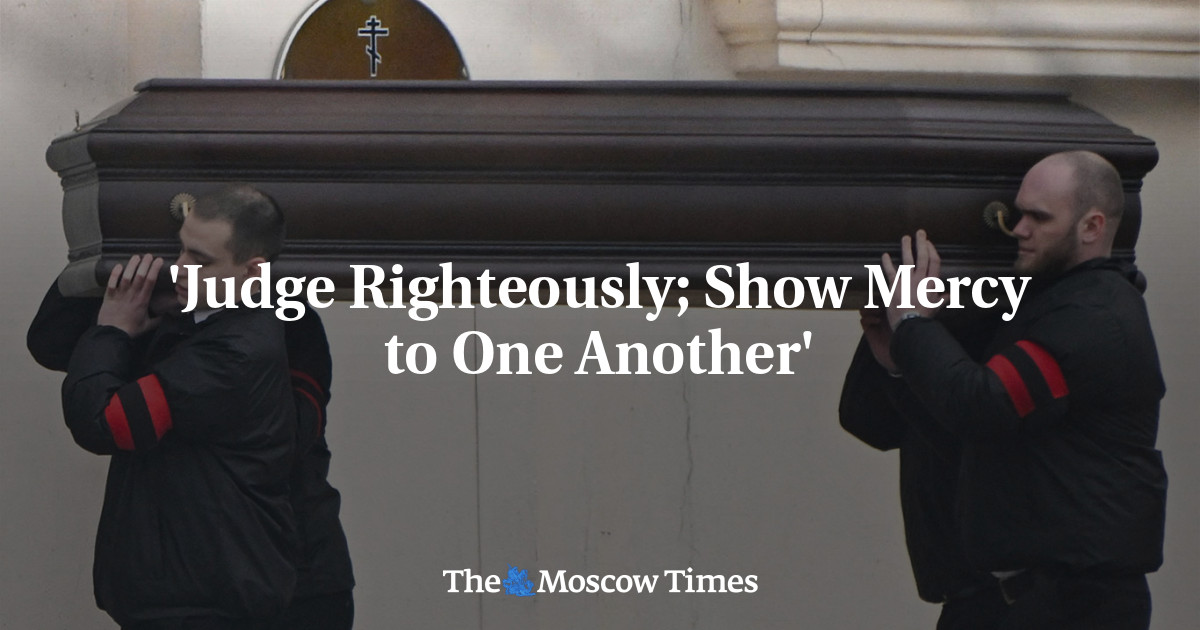
Похороны: funeral
If you have been following the the funeral of Alexei Navalny in Russian, you might be struggling to understand some of it. And no wonder.
The Russian language makes a distinction between a religious (in this case Orthodox Christian) funeral and a non-religious funeral.
But for both, the general term for a funeral is похороны, stress on first syllable. The word is related to words for preserving and protecting — for example, хранить (save, preserve) and охрана (guard, protector). Note that похороны only exists in the plural: В пятницу состоялись похороны великого политического деятеля (On Friday the funeral of a great politician was held). Мы вернулись с похорон (We came back from the funeral).
If that seems odd, you might recall several other plural-only nouns, all of which describe some kind of activity that takes place over a period of time with many people, such as проводы (going away party); посиделки (a get-together); крестины (a baptism).
A religious funeral begins with панихида, which is the service for the dead, from the Greek pannychis, an all-night vigil. It is said by a priest over the body of the deceased right after death. The funeral service is отпевание, which translates literally as the beautiful “singing someone away.” After the church service, the casket is brought to the cemetery in катафалк (a hearse) for what is call погребение (interment) or похороны (funeral).
A non-religious funeral might have траурный митинг (funeral gathering) or the strange phrase гражданская панихида, literally “non-religious service for the dead.” This might take place in похоронный зал (funeral hall); церемониальный зал or церемониальная комната морга (ceremonial hall or room in the morgue); or зал для прощания (literally a hall for saying goodbye).
In Russian the deceased can be called покойный (the deceased, the late): Покойный этого ужасно не любил (The deceased really disliked that). Мой покойный родитель тоже был инженером (My late father was also an engineer). Or one can say умерший (deceased): Мой отец, недавно умерший, был искренне верующим человеком (My father, who died recently, was a truly ardent Christian). Традиционно в православии умершего хоронят на 3-й день (In Orthodox Christianity the deceased is traditionally buried on the third day after he or she died.)
In religious texts and statements the deceased is усопший — one who is reposed, from the verb усопнуть, used exclusively in religious contexts meaning to fall asleep (уснуть). In English one usually says to “fall asleep in the Lord.” In the context of death and funerals, the verb упокоиться is to rest at peace: Это страна, в которой упокоился усопший (That’s the country where the deceased was laid to rest). Да упокоится с миром! (May he rest in peace!)
When famous people die, there is often a day or evening in зал для прощания (hall for farewell) for people to come and pay their respects. In Russian you can say that, too: почтить память (to honor the memory of the deceased). But often it is more intimate. People come проститься or попрощаться (to say good-bye). You might also say проводить усопшего в последний путь (to accompany someone on his/her final journey): Я никогда не видела, что бы столько людей провожало усопшего в последний путь (I never saw such huge crowds gathered to bid the deceased farewell on his final journey).
After the funeral, people gather again at поминки — another only-plural word — the funeral feast or reception. This might also be called поминальная трапеза (memorial meal).
There are a number of traditions connected with funerals, some religious, some superstitious, and many of them are superstitions that have somehow become almost religious traditions. Only bring an even number of flowers. This might be because in ancient times even numbers symbolized the conclusion of earthly life — which is why you only bring an odd number of flowers everywhere else.
За усопших выпивают не чокаясь (you don’t clink glasses when drinking to the deceased). There are many explanations for this, most of them based on the belief that the soul of the departed is present at the table. One version has it that clinking glasses is a sign of a party and so inappropriate at this sorrowful occasion. Another version is that you should not disturb the soul(s) present by the sound of glass clinking. Yet another version is that when you clink glasses you might pass on some of your unhappiness or misfortune, and that could be intercepted by the soul of the departed.
There are more folk beliefs: Нельзя в день похорон выносить мусор, убираться и стирать в доме (On the day of the funeral you shouldn’t take out the garbage, clean your house, or do your laundry). Нельзя оставлять после выноса гроба двери и ворота открытыми (After the coffin is taken from a house [or building], don’t leave the door or garden gate open).
And of course: Нельзя плохо говорить о покойнике (Don’t speak ill of the dead).
The church were the funeral service for Alexei Navalny was held is called Храм иконы Божией Матери “Утоли моя печали“ (The Church of the Icon of the Mother of God “Assuage My Sorrows”). It is fairly common for a church to be named in honor of an icon, in this case a wonderworking icon that came to Russia in a battle during the early 17th century. The original icon was thought to have come from a Russian Monastery on Mount Athos. The icon depicts the Mother of God holding her left hand to her cheek while cradling the Christ Child with her right hand. Christ holds a scroll with a message:
“Суд праведный судите, милость и щедроты творите кийждо искреннему своему; вдовицу и сиру не насильствуйте и злобу брату своему в сердце не творит.”
“Judge righteously; each show mercy to one another; do not offend widows and orphans, and do not keep malice in your heart towards your brother.”





